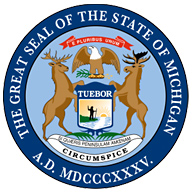 Newspapers in Michigan expect a bill to be introduced soon that would move all local government notices from newspapers to government websites. Although similar bills have been introduced every legislative session in Lansing for the last 12 years, this time Michigan newspapers are in a state of alarm.
Newspapers in Michigan expect a bill to be introduced soon that would move all local government notices from newspapers to government websites. Although similar bills have been introduced every legislative session in Lansing for the last 12 years, this time Michigan newspapers are in a state of alarm.
“I’m more worried than I’ve ever been,” said Lisa McGraw, who has been public affairs manager of the Michigan Press Association (MPA) since 2003.
What makes this time different?
FCC proposes eliminating newspaper notices … again
 Twenty-three months after it initially issued a Notice of Proposed Rulemaking (NPRM) recommending the elimination of newspaper notice for broadcast license applications, FCC last week issued a Further Notice of Proposed Rulemaking (FNPRM) reiterating its original recommendation and offering additional details about how it proposes to revise broadcasters’ public notice obligations.
Twenty-three months after it initially issued a Notice of Proposed Rulemaking (NPRM) recommending the elimination of newspaper notice for broadcast license applications, FCC last week issued a Further Notice of Proposed Rulemaking (FNPRM) reiterating its original recommendation and offering additional details about how it proposes to revise broadcasters’ public notice obligations.
PNRC filed comments in 2017 opposing the recommendation in the original NPRM and 35 press associations signed onto the comments. PNRC and the National Newspaper Association also met with FCC staff last fall to oppose the changes.
A few observations about the FCC’s new proposal:
When the city learns what the county is doing by reading the notices
 The City of Hobart, Indiana, is suing a local restaurant owner after learning he breached a mortgage agreement for the purchase of the old Hobart Police Department building in the city’s downtown area (that’s downtown Hobart on the left), according to The Times of Northwest Indiana.
The City of Hobart, Indiana, is suing a local restaurant owner after learning he breached a mortgage agreement for the purchase of the old Hobart Police Department building in the city’s downtown area (that’s downtown Hobart on the left), according to The Times of Northwest Indiana.
It’s a complicated story that is part of The Times’ larger investigation of corruption in Lake County’s tax sale process (see editorial below). It caught our eye for one reason. The city learned it was being cheated by reading notices published by Lake County, Indiana in a local newspaper. Here’s how the Times put it:
Why we call it “public notice”
 Statutorily required notice goes by a number of different names. There’s “public notice”, of course. “Legal notice” is a big one. “Legal ads” is also used quite often. And then there’s plain old “legals”, as in “the legals”.
Statutorily required notice goes by a number of different names. There’s “public notice”, of course. “Legal notice” is a big one. “Legal ads” is also used quite often. And then there’s plain old “legals”, as in “the legals”.
Ask someone in the newspaper business what they’re called and you may get any one of those answers. Ask someone outside the newspaper business the same question and the response is likely to be, “Huh?”
There are a number of reasons for the public confusion over public notice advertising, including the fact that the newspaper industry can’t agree on a name for them. Branding 101 would suggest that’s a problem.
Two newspapers that get creative with notice
Print circulation has been declining for years, so newspapers must become creative if they expect to continue to attract eyeballs to their public notice ads.
In Ketchum, Idaho, the Idaho Mountain Express has for many years maintained a pretty simple strategy for drawing attention to their public notices: The 45-year-old newspaper publishes a “Cliff Notes” summary of notices in the news section of its print edition (see graphic below); the summary points readers to the complete, official notices published in its “local life” section. The Mountain Express also publishes the summary in its e-edition along with instructions for where readers can find the official public notices in the print issue and online.
Unusual legislative maneuvers worry Texas newspapers
 The Texas Press Association (TPA) had a challenging year in the legislature. In this case, “challenging” isn’t deployed as a euphemism to describe a poor outcome. It’s used in its traditional sense to describe a situation that was demanding and arduous.
The Texas Press Association (TPA) had a challenging year in the legislature. In this case, “challenging” isn’t deployed as a euphemism to describe a poor outcome. It’s used in its traditional sense to describe a situation that was demanding and arduous.
Texas legislators introduced 7,324 bills in the state’s 2019 biennial session that ended in late May. TPA was tracking 220 of them, including 60 that related directly or tangentially to public notice. Executive Vice President Donnis Baggett describes the session as “hellacious”.
Hog farm saga comes to an end
 In December 2012, residents of Newton County, Arkansas were surprised to see a hog farm being built on the banks of Big Creek, a tributary on the Buffalo National River. The state’s Department of Environmental Quality (ADEQ) had approved a permit for C&H Hog Farms to operate the Concentrated Animal Feeding Operation (CAFO). Notice about the farm was published that summer on ADEQ’s website but not in a local newspaper.
In December 2012, residents of Newton County, Arkansas were surprised to see a hog farm being built on the banks of Big Creek, a tributary on the Buffalo National River. The state’s Department of Environmental Quality (ADEQ) had approved a permit for C&H Hog Farms to operate the Concentrated Animal Feeding Operation (CAFO). Notice about the farm was published that summer on ADEQ’s website but not in a local newspaper.
Several years of lawsuits and increased environmental activism followed.
As legislatures adjourn for the year, newspaper notice as strong as ever
We’ve heard dire warnings for many years that public notice would soon be moving from newspapers to the internet. Yet here we are, twenty years after the pessimists first began predicting doom, and newspapers are still the primary vehicle for official notice in all 50 states.
 And after several mostly successful years defending public notice in state legislatures, the newspaper industry is faring especially well on that front in 2019. With 33 legislative bodies already shuttered for the year and eight others scheduled to adjourn sine die by the end of the month, the third leg of the government-transparency stool is looking pretty stable.
And after several mostly successful years defending public notice in state legislatures, the newspaper industry is faring especially well on that front in 2019. With 33 legislative bodies already shuttered for the year and eight others scheduled to adjourn sine die by the end of the month, the third leg of the government-transparency stool is looking pretty stable.
In year of heightened legislative activity, Arkansas and Virginia score big wins
 We’re only four months into the year and more public notice bills* have already been enacted than in all of 2018.
We’re only four months into the year and more public notice bills* have already been enacted than in all of 2018.
Like 2018, the truly bad bills — the existential threats to newspaper notice — are either going nowhere or have already been defeated. The two state press groups that appeared to face the greatest danger — Missouri Press Association and Hoosier State Press Association, both of which fought bills that would have eliminated newspaper notice of foreclosure sales — survived to fight another day. Indiana HB1212 passed the House but died in the Senate when the legislature adjourned last week. Missouri HB686/SB50 hasn’t managed to make it out of committee in either chamber with only two weeks left in the session even though an almost-identical piece of legislation came dangerously close to passage in 2018.
Foreclosure notices at issue in Midwestern states
A bill that would have eliminated the newspaper publication requirement for foreclosure notices in Indiana was narrowly defeated last week in a vote taken immediately following a committee hearing.
House Bill 1212 had passed the Indiana House 62-34 in January and was in danger of moving another step closer to passage when it was defeated by a vote of 5-4 in the Senate Local Government Committee.

